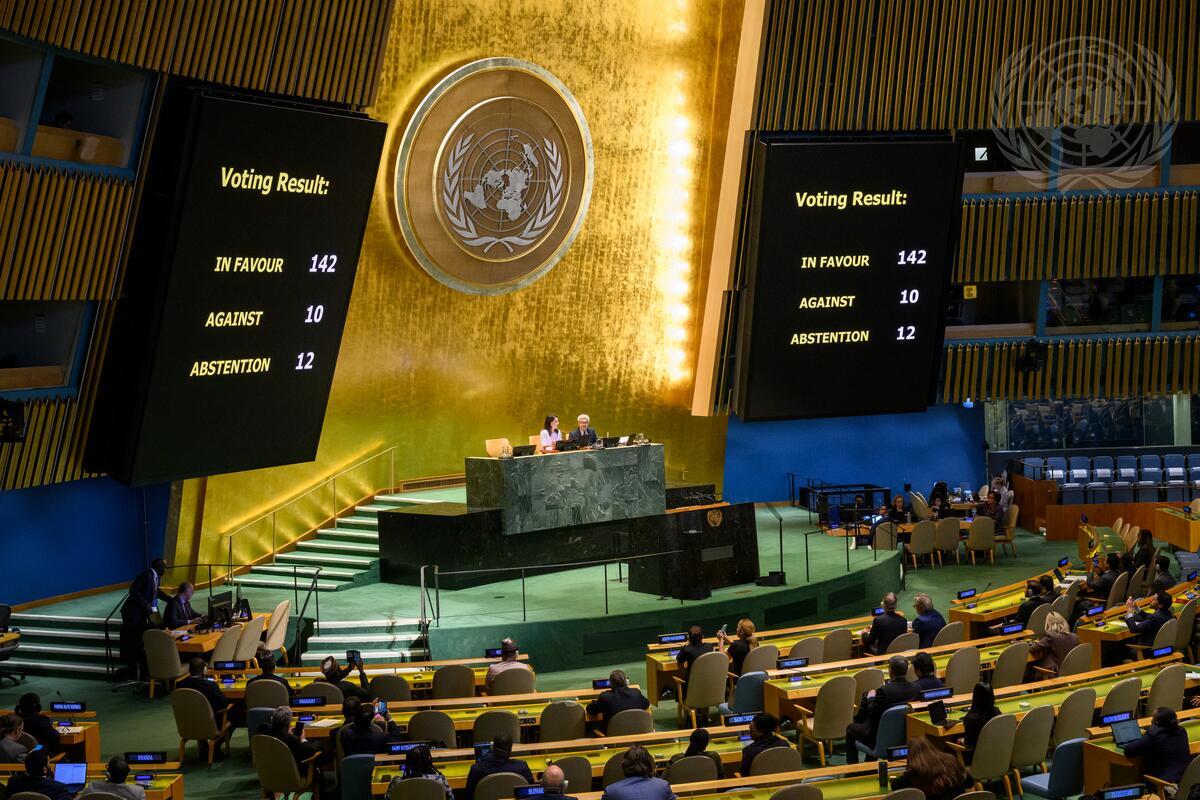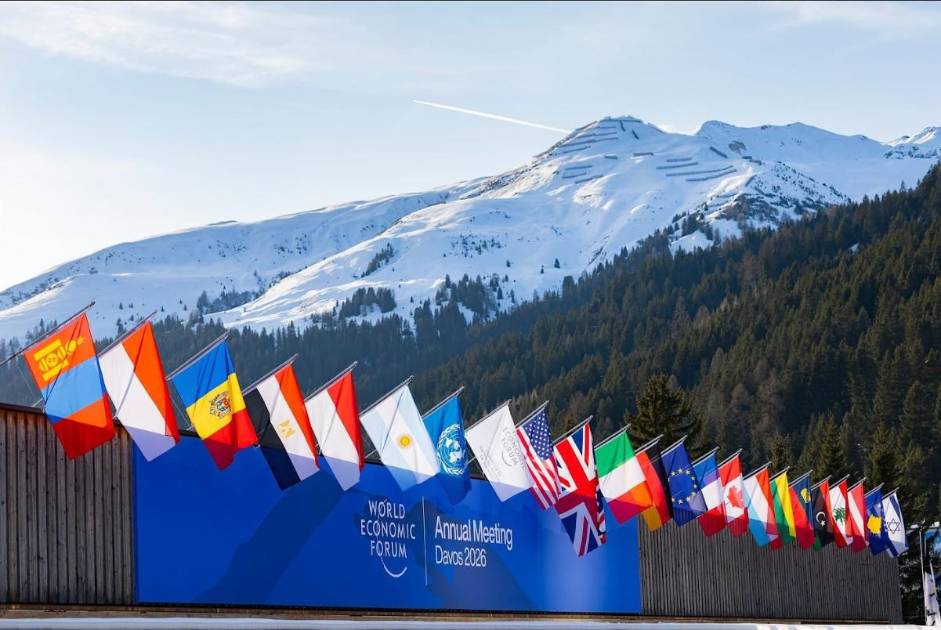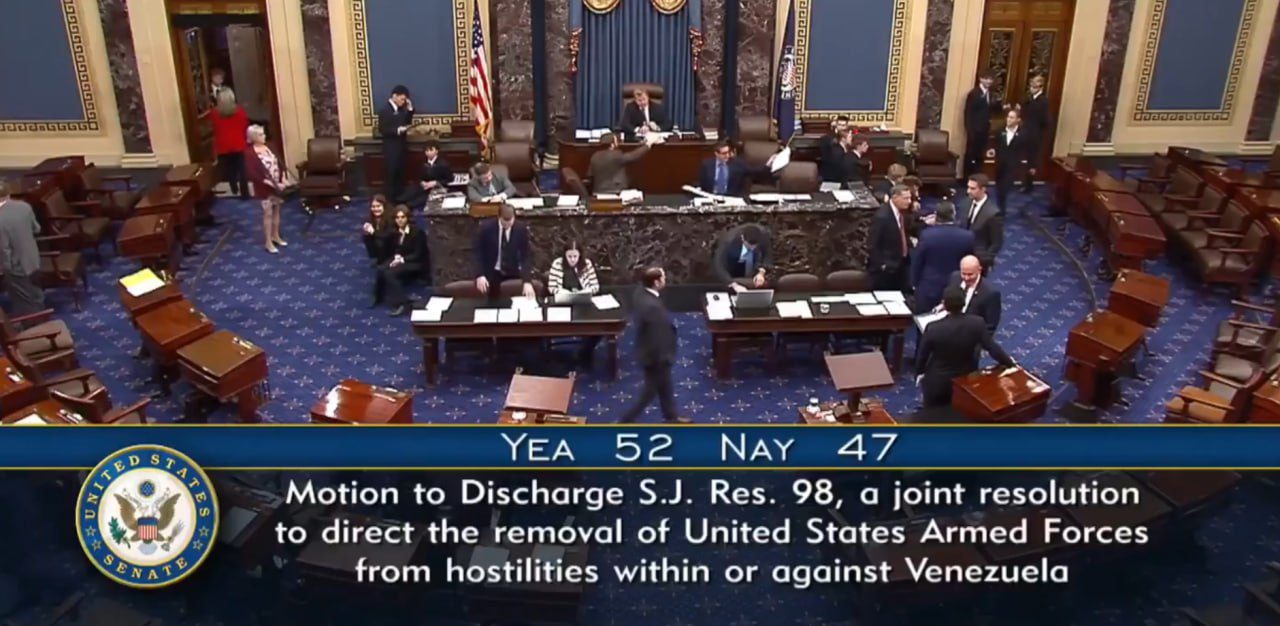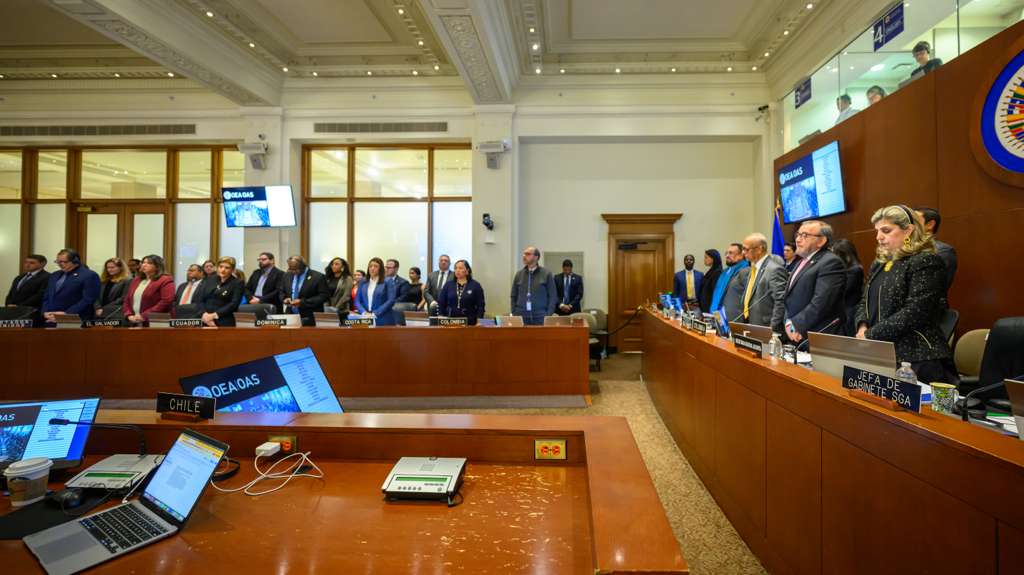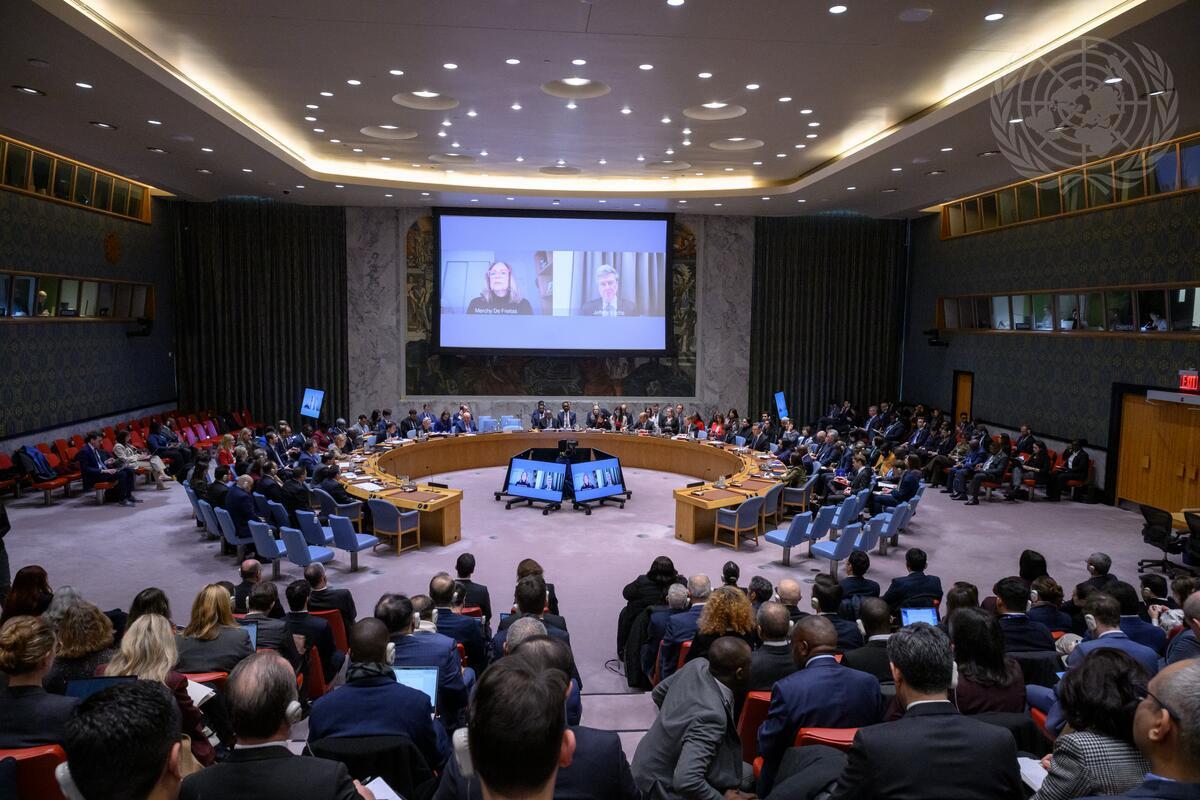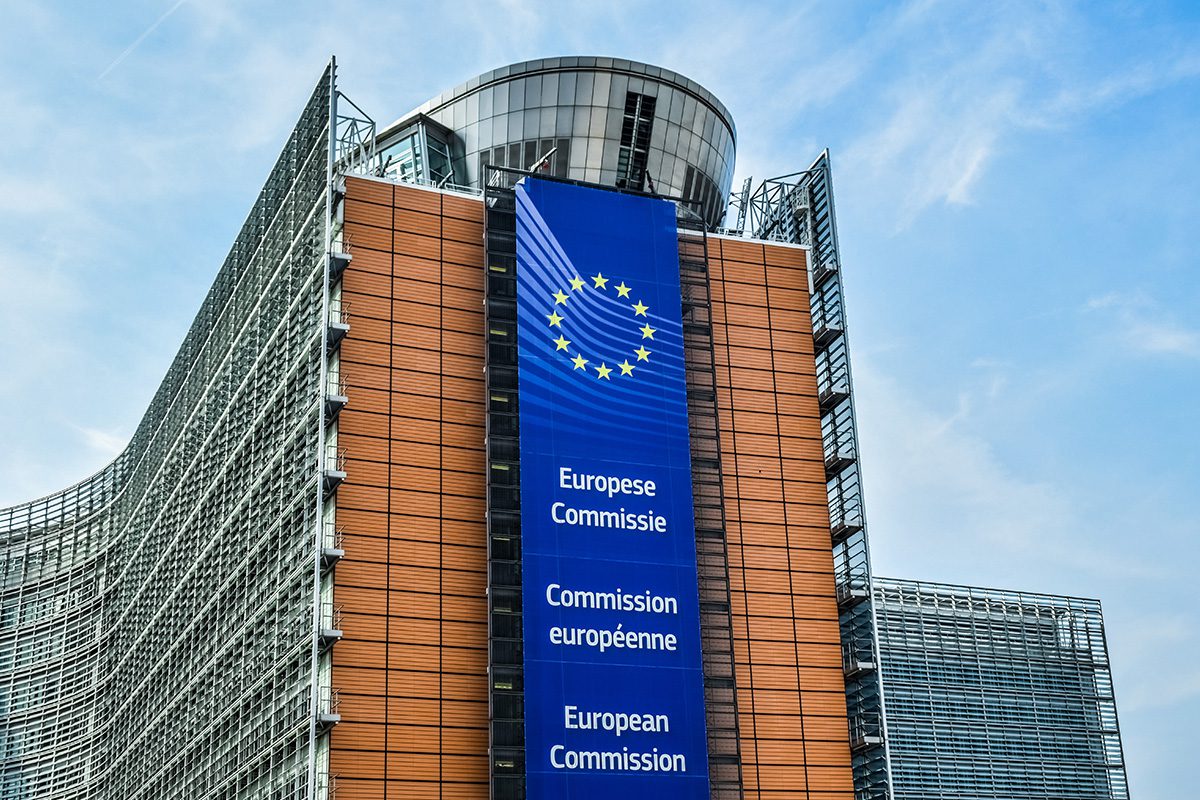Voting results are displayed as the United Nations General Assembly voted on a nonbinding resolution calling for a ‘humanitarian truce’ in Gaza and a cessation of hostilities between Israel and the Palestinian armed group Hamas on Friday, October 27. Bebeto Matthews / AP.
Guacamaya, September 12, 2025. With 142 votes in favor, the General Assembly adopted a resolution promoting the creation of a sovereign Palestinian state, the disarmament of Hamas, and the transfer of Gaza’s administration to the Palestinian Authority. The text, promoted by France and Saudi Arabia, is approved days before a key summit in New York.
The UN General Assembly approved this Friday, by a wide majority, a resolution endorsing the so-called New York Declaration, a plan promoted by France and Saudi Arabia to revive the two-state solution —Israel and Palestine— as a way out of the conflict in the Middle East. The document received 142 votes in favor, 10 against —including Israel, the United States, and Argentina— and 12 abstentions.
The initiative proposes a roadmap that includes an immediate ceasefire in Gaza, the release of hostages, the disarmament and exclusion of Hamas from governing the enclave, in favor of transferring responsibilities to the Palestinian Authority. It also proposes the creation of a viable and sovereign Palestinian state, along with the normalization of relations between Israel and the Arab world under a framework of collective security guarantees.
The French representative defended the text as “a unique plan to materialize the two-state solution.” The vote takes place just before the international summit convened for September 22 in New York, where France and several countries have announced they will officially recognize the Palestinian state.
The resolution, however, drew criticism. The Israeli ambassador to the UN called it “theater,” stated that “Hamas is the only beneficiary,” and questioned the practical feasibility of disarming the organization. The United States supported these criticisms, calling the resolution a “publicity stunt.” In contrast, the Palestinian ambassador thanked the Assembly’s support and called for more countries to join the two-state solution.
Venezuela’s Relations with Palestine
Relations between Venezuela and Palestine were consolidated in 2009 when the Venezuelan government, under Hugo Chávez, officially recognized the Palestinian state and established full diplomatic relations, being one of the first in Latin America and the Caribbean to do so. Since then, Caracas has maintained a firm position of support for the Palestinian cause in multilateral forums such as the UN, the Non-Aligned Movement, and the Group of 77.
In 2011, Venezuela supported Palestine’s admission as a full member of UNESCO, and in subsequent years has reiterated its defense of the Palestinians’ right to an independent state with East Jerusalem as its capital.
Within the framework of the United Nations, Venezuela has consistently voted in favor of resolutions critical of Israel and favorable to Palestine. For example, in 2012 it backed the General Assembly resolution granting Palestine the status of non-member observer state (138 votes in favor, 9 against). More recently, as a member of the Security Council in 2015-2016, Venezuela supported resolutions condemning the expansion of Israeli settlements in occupied territories, aligning itself with the Arab majority and non-aligned countries.
Beyond the diplomatic sphere, support for Palestine has been framed within the anti-imperialist discourse of Venezuelan governments, reinforced with cultural, academic, and cooperation initiatives in international forums. Chávez previously and Maduro currently have made this support a banner of their foreign policy.
Venezuela’s Relations with Israel
Venezuela recognized the State of Israel in 1948 and maintained stable diplomatic relations for decades, with cooperation in the areas of agriculture, trade, and technology. In the 60s and 70s, Israeli experts participated in agricultural development projects in Venezuela, particularly in irrigation and food production.
The shift occurred under the government of Hugo Chávez, within the framework of his political rapprochement with the Arab and Islamic world and his confrontation with Washington. Following the Israeli offensive in Gaza in 2009, Caracas broke diplomatic relations with Tel Aviv, expelling the staff of the Israeli embassy and closing its own mission in Israel. Since then, relations remain severed.
In the UN arena, Venezuela has positioned itself in votes against initiatives perceived as favorable to Israel. In 2017, for example, it supported the General Assembly resolution rejecting the recognition of Jerusalem as the capital of Israel following the US decision, which received 128 votes in favor against 9 opposed. In subsequent votes on the situation in Gaza and Jerusalem, Caracas has remained in the bloc supporting Palestine, voting against proposals that, from the Israeli perspective, legitimize its position.
The bilateral relationship with Israel remains tense as of 2025, with no signs of formal diplomatic restoration and minimal direct dialogue channels. Israeli diplomacy has publicly supported various sectors of the Venezuelan opposition, especially that led by María Corina Machado, and have invited Edmundo González Urrutia to make an official visit which has not yet materialized. The opposition leader has also publicly denounced the Maduro administration’s outreach and relationship with Iran.
Situation of Venezuela’s Voting Rights in the UN General Assembly
Venezuela currently does not have the right to vote in the UN General Assembly due to arrears in its contributions to the regular budget of the Organization. In this regard, pursuant to Article 19 of the UN Charter, a Member State loses its voting rights if it owes a sum equal to or greater than the contributions due for the preceding two full years.
The exact amount Venezuela must pay to regain this voting right was approximately $40 million according to 2022 reports. More recent reports indicate that the country’s overall debt to the UN could reach nearly $76 million, although this latter figure includes additional obligations and not necessarily the minimum required for the restoration of voting rights. The Venezuelan government has attributed the delays to international financial sanctions, which it argues hinder bank transfers to fulfill its obligations.

